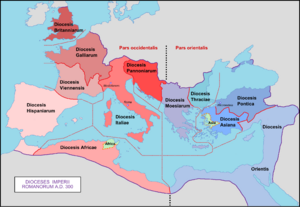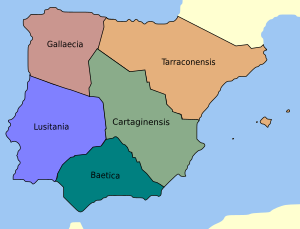Diocese of Hispania facts for kids
The Diocese of Hispania was a special administrative area of the Roman Empire. It was located on the Iberian Peninsula, which is where modern-day Spain and Portugal are. This area existed from about 314 AD to 409 AD. Its main city, or capital, was Augusta Emerita (which is now Mérida in Spain).
A person called a vicarius (say: vih-CARE-ee-us) was in charge of the Diocese of Hispania. This vicarius reported to a higher official called the praetorian prefect of Gaul (modern-day France). Think of it like a governor who reports to a regional manager.
How it was Organized
The Diocese of Hispania was made up of several smaller areas called provinces. When it was first created, it had six provinces:
- Hispania Baetica
- Lusitania
- Hispania Carthaginensis
- Gallaecia
- Hispania Tarraconensis
- Mauretania Tingitana (This province was actually in North Africa, not on the Iberian Peninsula!)
Later, in the 4th century, the Balearic Islands (a group of islands in the Mediterranean Sea) became their own province called Hispania Balearica. This made a total of seven provinces within the Diocese of Hispania.
A Brief History
The Roman Empire was very large and needed good organization. Around 300 AD, Emperor Diocletian reorganized the empire. He divided the many provinces into larger groups called dioceses. The Diocese of Hispania was one of these new groups.
The Diocese of Hispania lasted for almost 100 years. However, around 409 AD, groups like the Vandals, Alans, and Suebi began to invade and conquer parts of Hispania. This led to the collapse of the Roman control over the area, and the Diocese of Hispania eventually ended.
See also
 In Spanish: Diócesis de Hispania para niños
In Spanish: Diócesis de Hispania para niños



